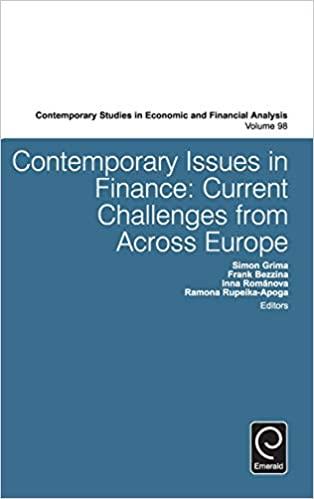Question
1. Suppose Kyle receives a payroll check for $150. He then alters the check so it reads $1,500 instead of $150. Is he a holder
1.
Suppose Kyle receives a payroll check for $150. He then alters the check so it reads $1,500 instead of $150. Is he a holder in due course of the check?
A. Yes, Kyle took the instrument without notice.
B. No, the check is overdue.
C. Yes, Kyle meets all four requirements for HDC status.
D. Yes, Kyle cashed the check in good faith.
E. No, Kyle renders the check as defective by altering it.
2. A holder in due course is a person who takes a ______________, such as a check or promissory note, for value and in good faith, without notice of defects in the instrument.
A. tender
B. bond
C. commercial paper
D. negotiable instrument
E. banknote
3. Which of the following defenses is a holder in due course (HDC) subject to?
A. Duress
B. Breach of contract
C. Forgery
D. Lack of consideration
E. llegality
4. Suppose Brett and Lauren plan to defraud Mallory. Mallory, who is unaware of the scheme, writes a check to Lauren. Lauren negotiates the check to Allen, who becomes an HDC through the negotiation. If Allen negotiates the check to Brett, _____________________________________.
A. Lauren and Brett both would be HDCs because of the shelter principle
B. Brett would not be an HDC because he engaged in the original fraud
C. Mallory would be the only HDC of the check
D. Brett would be an HDC because of the shelter principle
E. Lauren would not be an HDC because she engaged in the fraud
5. If an instrument is transferred from a party with HDC status, the next party _________________________.
A. receives the shelter principle
B. cannot receive HDC status unless it meets all the requirements for HDC status
C. does not receive the dishonored instrument
D. receives a dishonored instrument
receives HDC status
6. Generally, a holder of an instrument has to notify the transferor of a dishonor within _____________.
A. 10 weeks
B. A reasonable period of time
C. Before midnight of that business day
D. 30 days
E. 24 hours
7. Which of the following refers to a party who signs a negotiable instrument to restrict payment of it, negotiate it, or incur liability?
A. Holder
B. Maker
C. Accepter
D. Endorser
E. Drawer
8. If Joe were to transfer to Martha a negotiable instrument in good faith, then Joe warrants each of the following except:
A. That Joe has not altered the instrument.
B. That the signatures on the instrument are authentic.
C. That Martha is entitled to enforce the negotiable instrument.
D. That Joe has no knowledge of insolvency proceedings against the maker, acceptor, or drawer of the instrument.
E. That the instrument is subject to a claim in recoupment.
9. If a material alteration of an instrument exists but is not fraudulent, ______________________.
A. the party whose rights have been affected by the change is completely discharged from the instrument
B. the instrument will not be enforced, and the maker can sue the alterer or commit a tort against him
C. the instrument will not be enforced under the original terms
D.the instrument will be enforced with the material alteration intact
E. the instrument will be enforced under the original terms
10. All of the following are real defenses except ____________.
A. failure of consideration
B. fraud in the factum
C. forgery
D. material alteration
E. infancy
Step by Step Solution
There are 3 Steps involved in it
Step: 1

Get Instant Access to Expert-Tailored Solutions
See step-by-step solutions with expert insights and AI powered tools for academic success
Step: 2

Step: 3

Ace Your Homework with AI
Get the answers you need in no time with our AI-driven, step-by-step assistance
Get Started


